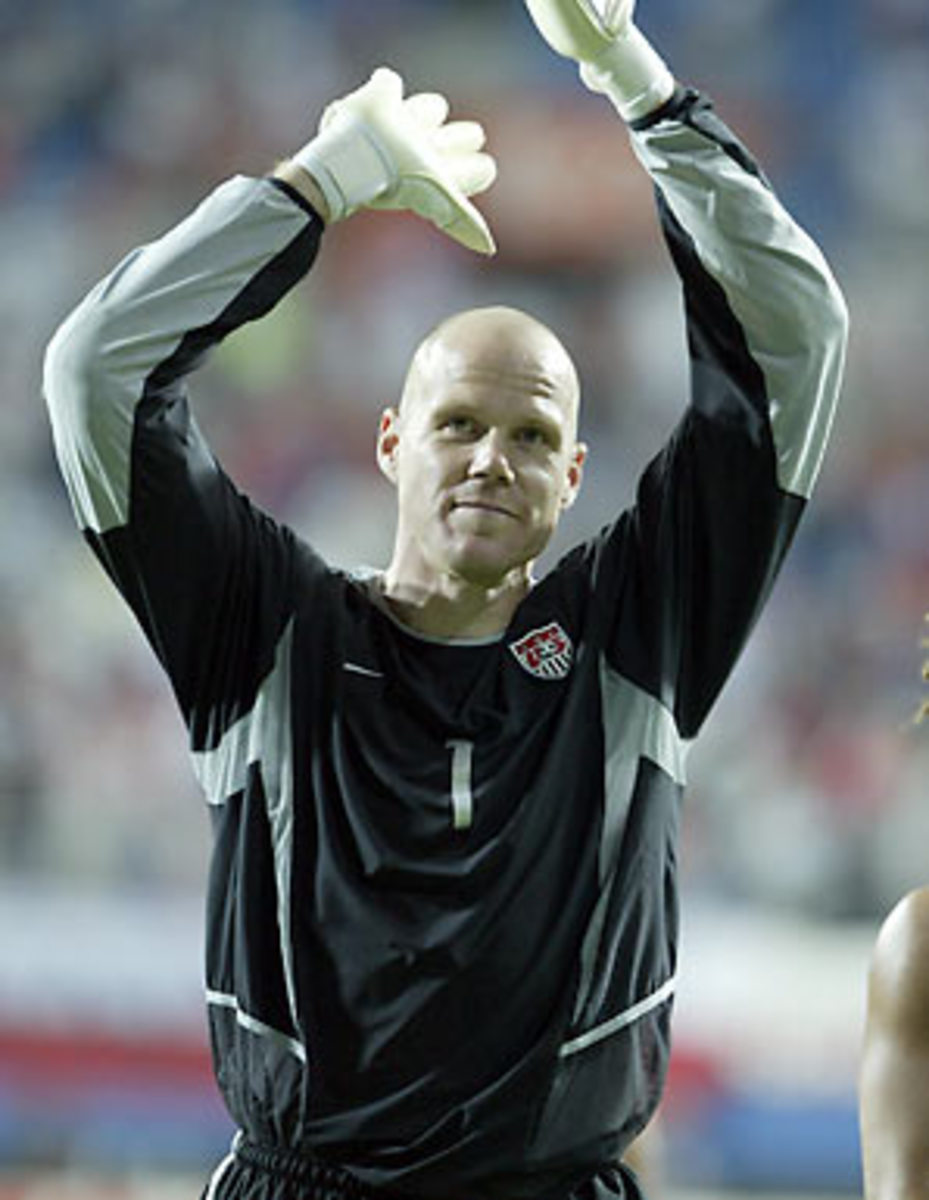Brad Friedel is still blazing a trail for every American with dreams
Any hopes of a career in soccer seemed about as realistic as our hopes of becoming the guitarist for Whitesnake or dating the French exchange student from Better Off Dead. And the notion that an American might someday be the iron man in the English Premier League was downright laughable.
Which is what makes Brad Friedel's record for consecutive games in the EPL -- 170 and counting -- so amazing. The 36-year-old Aston Villa netminder is doing exactly what we all assumed an American would never be able to do.
I still remember playing against Friedel in some tournament somewhere in Ohio back when we were both teenagers. He was big and quick then, too, and my memory can still conjure up one save in particular. One of my teammates on my Michigan-based club team, Vardar, reached the end line on the right side and cut a cross back toward the penalty spot. A late-arriving midfielder, perhaps the silky smooth Johnny Gentile, struck a one-time shot pegged for the far side netting. Somehow, Friedel reacted before the ball left his foot, stretched to his right, and shoved the ball just around the post.
That save has stuck with me ever since. It was an early hint of Friedel's talent, though none of us back then had any idea what a special talent it was. We didn't know it was the kind that could compete at the highest levels in Europe. We played mostly in a vacuum: no FSC, no Tommy Smyth, no 101greatgoals.com. What we did get -- Soccer Made In Germany, the 1986 World Cup on CBC -- we viewed as some kind of fantasy world where mythical geniuses played in front of massive crowds. We pretty much assumed we could/would never be a part of it.
Somehow Friedel, and a few others, never seemed to buy that, though. At the 1992 Olympics, he was the starter on a U.S. team that included Claudio Reyna, Alexi Lalas (full disclosure: my brother) and Joe-Max Moore, all of whom later had successful stints in Europe, and Friedel made his first attempt to go overseas the following winter.
It didn't always go smoothly. He bounced around for a few years, back and forth between Europe and the States, but finally in 2000, he landed at Blackburn Rovers and never looked back.
Actually, that's not true. He did look back. He looked back at his own development as a youth player in Bay Village, Ohio, a suburb of Cleveland, and realized that there could be a better way to nurture talent, especially now that American players are no longer taboo in Europe (or as taboo).
"The system is broken in the U.S.," Friedel said in an interview in October. "Not least because you actually have to pay to play. Some kids are paying as much as $5,000 a year just to play for a decent club team."
To Friedel's way of thinking -- and it makes more sense than ever in today's economic climate -- if money is a deciding factor, good players who can't afford the price are going to fade away or slip through the cracks. Which is why he created Brad Friedel's Premier Soccer Academies (PSA), a unique soccer-training residency program and $11 million facility located in Lorain, Ohio. It's designed to help talented players rise to the top, free of charge.
Initially, PSA was meant to be very international in scope, bringing in promising young players from Mexico, South America and Africa, along with those from the U.S. Last week, Friedel announced that PSA would focus more on local players from Northeast Ohio, and that it had entered into a partnership with the Cleveland Alliance Soccer Association. I'm sure economics played a role in the decision to stay more local, but its consequences for local players could be the silver lining.
"We need to get back to focusing on the talent within our community, Ohio and our region," Friedel said in a PSA statement. "I have always stated that talent is talent. By providing opportunities like this, you are giving players hope to move to the next level in the game."
There it is: hope, buzzword of the zeitgeist in '08. I shake my head and smile when I think of the hopes of today's rising generation: Whereas we hoped to play college soccer, they seriously hope to play in the Champions League.
"Maybe someday they will then be in a position to pay it forward themselves and help others," Friedel said. "This cycle has to start somewhere and I want to have it start with me and start now."
Brad, let me tell you: You started it a long time ago.





